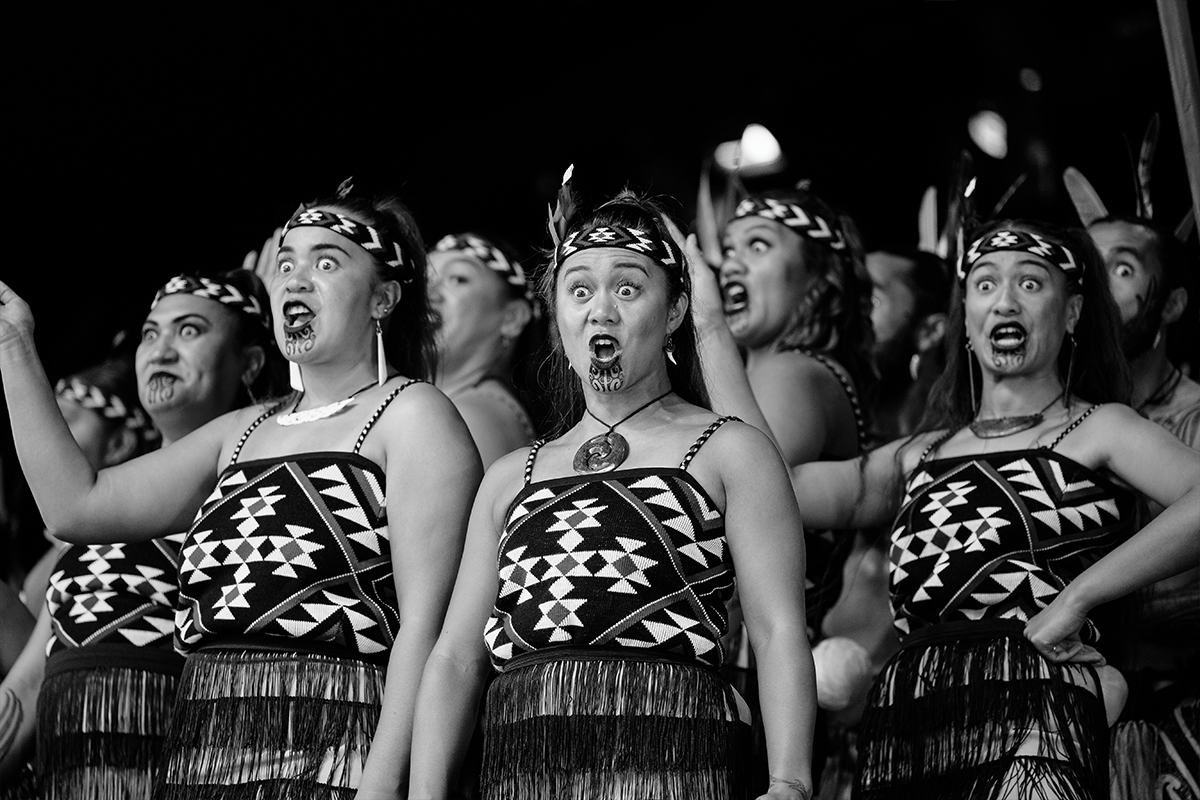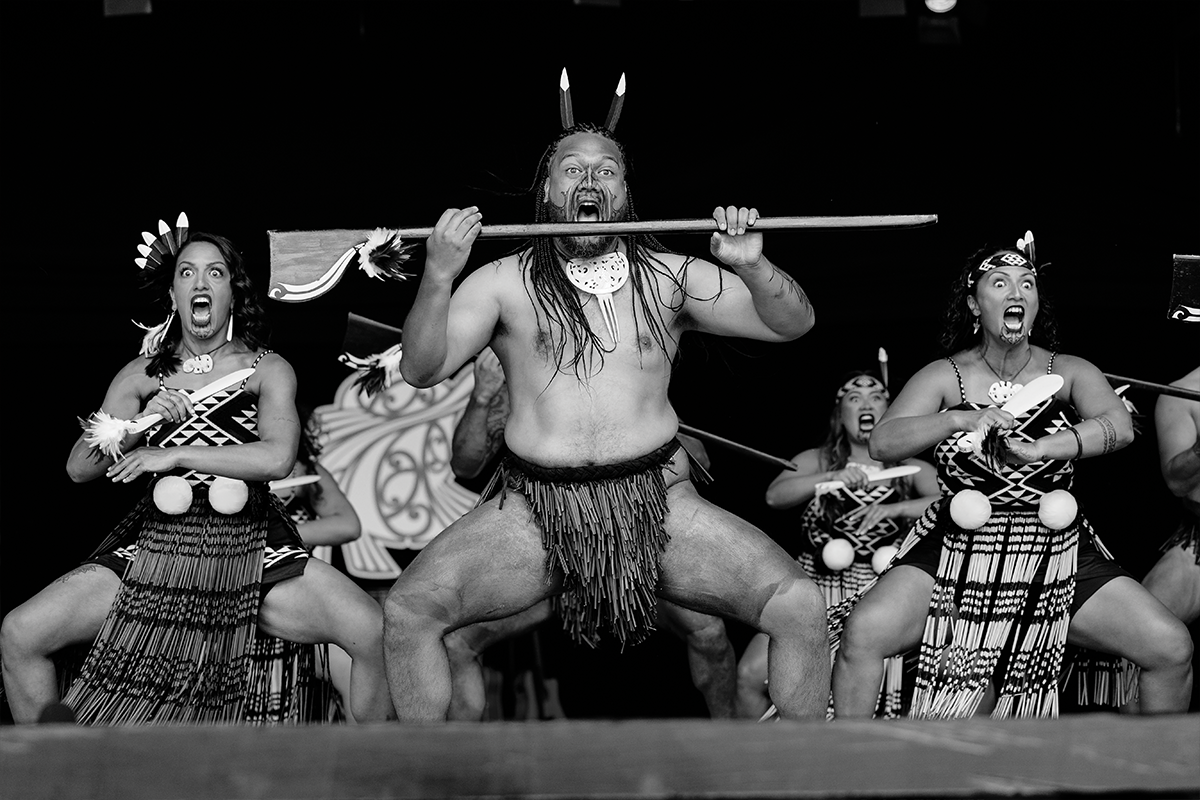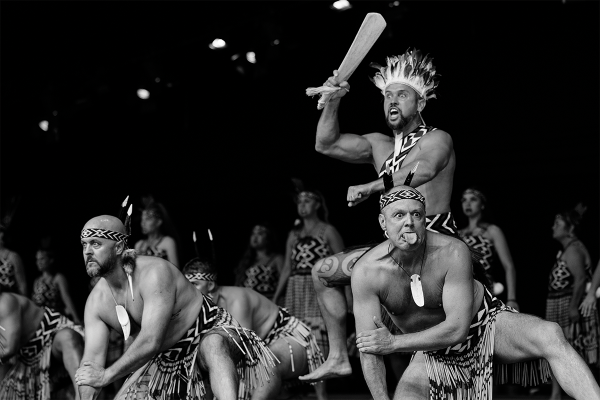Te Matatini has returned after a four-year hiatus, with a fiery comeback in Tāmaki Makaurau. Known as the ‘Olympics of Māoridom’, or even the ‘Broadway of the Pacific’, 45 groups across 13 regions gathered to celebrate the competition’s great return after the ongoing pandemic and recent storm events across the North Island. There was great speculation regarding the status of Te Matatini, and whether it would go ahead, as groups like Mātangirau and Tamatea Arikinui were unsure of the possibility of reaching the stage due to the destruction in their region, Hawkes Bay, after Cyclone Gabrielle. After a treacherous journey to Te Matatini, Mātangirau presented themselves to the masses with their feet painted in mud to symbolise the struggles that awaited them at home.
It goes without saying that Te Matatini and its great return was a theatrical one, but the tea wasn’t reserved for the stage alone. The pōhiri (welcome ceremony) was riddled with political differences - the main issue being the claim that Tainui are manawhenua of central Auckland alongside Ngāti Whātua Ōrākei, which sparked a formidable verbal battle between manawhenua and the manuhiri (visitors). Then the heat turned up when Tuokoroirangi Morgan recounted an exchange between Governor Grey and Pōtatau Te Wherowhero surrounding the 1849 agreement to protect Tāmaki. Morgan claimed that Ngāti Whātua didn’t take part, justifying Tainui status as manawhenua of the region and the significance of the kīngitanga (monarchy) to Auckland, referring to it as the ‘King’s home’. Naturally, this was not received well by manawhenua, who took offence to the statements and retaliated by denouncing the status of the monarchy in Auckland, announcing that Ngāti Whātua has never been under the authority of the monarchy and rejecting their “tainted” koha altogether.
Penetaui Kleskovic of Ngāpuhi took it upon himself to act as a mediator and collected the koha for its future provisions, quoting a prevalent Māori whakataukī: “a person who mistreats their guest has a dusty marae”, referring to the significance of hospitality for one’s guest in the hopes of attracting more - or at least not scaring them off.
The real cinematics came out to play on the stage, however, when Muriwhenua, the Far-North based rōpū, broke the ice of the event by kicking off day one with an electrifying performance and chilling whakaeke (entrance item). Muriwhenua are renowned for their strong relationship to Te Rerenga Wairua as the guardians of the leaping place for spirits. This is emphasised through their many waiata, and the white performance-moko that the male performers wear to signify their role as the spirit-walkers. Similarly, Hātea Kapa Haka of Whangārei-Te-Terenga-Parāoa in the North, previously famed for interpreting Queen’s ‘Bohemian Rhapsody’ in te reo Māori, are easily recognisable in their pine-green kākahu and bone carving pairings taking out the waiata tira (chorale) section alongside Tūhourangi Ngāti Wāhiao of Te Arawa, and Te Reanga Mōrehu o Rātana of Aotea waka featuring the established singer-songwriter Stan Walker (Tūhoe, Ngāti Tuwharetoa) in his Te Matatini debut performance in true Rātana fashion with the iconic Rātana brass band.

Te Matatini has long served as a platform for paying tribute to the deceased and making political statements. This is a concept that Te Iti Kahurangi of Waikato-Tainui are familiar with, having presented items such as the infamous ‘He Kau Kāwana’ which highlighted the Waikato land wars, as well as a haka directed at Māori Television criticising their method of reporting Māori affairs in a negative light. Te Iti Kahurangi were ridiculed by Rawiri Waititi of Te Pāti Māori for their lullaby dedicated to Jacinda Ardern’s daughter, whose middle name is Te Aroha. In response, the rōpū performed an action-song at the competition to the tune of ‘Proud to be Māori’ in praise of Waititi’s work in Parliament and as a co-leader of Te Pāti Māori. Aboard the same waka, Te Kapa Haka o Te Whānau-ā-Apanui also announced and endorsed Rawiri Waititi’s candidacy for this year’s upcoming election. Also a former Apanui performer, Waititi has stirred quite the commotion this year already; a seemingly newer trend of acknowledging our people while they’re still alive, rather than after their time.
Considering the nature of Te Matatini 2023, and having been four years since the previous campaign, many groups took to the stage to pay tribute to their own loved ones. A common theme at every Te Matatini, Tūhourangi Ngāti Wāhiao and Te Pikikōtuku o Ngāti Rongomai of Te Arawa and Te Poutūmārō of Waitaha were just a few of several groups to memorialise their loved ones who have passed since the last Te Matatini. Te Kapa Haka o Ngāti Whakaue in particular dedicated their exit item to a Māori soldier who fought with the 28th Māori Battalion in the Second World War and was sent on a ‘suicide mission’ but survived. Being told that he was to be awarded the British Victorian Cross, but due to another Māori soldier having received one already, he was denied the honour. And so, he was immortalised on the Te Matatini stage.
On another page of making haka history, Angitū Kapa Haka of Tāmaki Makaurau wowed the crowds by challenging the gender norms of Te Matatini with the inclusion of two takatāpui performers in the poi lines - unheard of. Angitū, a relatively new rōpū, also qualified in the top 12 selection to perform on finals day, winning first equal in the whakaeke and poi aggregate sections. Alongside them were former champions Ngā Tumanako and Waka Huia, as well as Te Taha Tū of the Auckland region who triple-tied first equal for Manukura Tāne. Despite handing over the Duncan McIntyre trophy, Ngā Tumanako remained gracious and humble champs, remaining on stage entirely to wait out their haka tautoko - a rarer occurrence.
An equally significant win was the surge of five groups from Te Arawa waka qualifying for the top 12: Te Mātārae i Ōrehu, Ngāti Rangiwewehi, Te Hekenga ā Rangi, Te Pikikōtuku o Ngāti Rongomai, and Te Kapa Haka o Ngāti Whakaue. Of these groups, the latter took out overall second equal with the 2017 champions Whāngārā Māi Tawhiti of Te Tairāwhiti. Somewhat new to the finals section of Te Matatini, Ngāti Whakaue also took out several aggregate items, a massive feat for Te Arawa and the Whakaue people. Taking home the Duncan McIntyre was two-time Te Matatini winners, Te Whānau-ā-Apanui of Mātaatua after two energising performances, old-school mōteatea and a refreshing rendition of Dion’s ‘Runaround Sue’ in te reo Māori - in true Apanui finesse - teasing the crowd with cheeky jokes about MP Peeni Henare needing to find his own promotional crew. Sounds like a future job for Waerenga Te Kaha.
In addition to the theatrical performances at this year’s campaign, behind the stands stood an array of some 150-Māori-owned small-businesses across the six marketplace villages. There was an outright ban on the selling of deep-fried products, fizzy drinks, and plastic, with a push for compostable packaging. The masses were instead treated to mussel fritters, whitebait and fresh paua (to name a few), promoted by entirely bilingual menus.

The livestream hosts shared that Te Matatini continuously works to fulfil the expectations of the Te Whare Tapa Whā health model, which illustrates the importance of maintaining these four dimensions in order to achieve a balanced wellbeing: physical health, spiritual health, mental health, and family health. Te Matatini supports each of these dimensions, from solidifying interpersonal relationships, providing a platform for cultural expression, equipping Māori with a second whānau, promoting physical upkeep and banning unhealthy food and drink. One might think that such a beneficial initiative would be backed by sufficient funding. Unfortunately, that is not the case.
For many whānau, kapa haka is a lifelong dream placed on the backburner due to financial restrictions. Te Pāti Māori have tirelessly campaigned for increases to the Te Matatini budget for this exact reason so as to make kapa haka more accessible for Māori. Of the three organisations that make up the Performing Arts Services - New Zealand Symphony Orchestra, New Zealand Royal Ballet, and Te Matatini - only Te Matatini reaches its target audience of 65,000. In addition to this, Te Matatini is the only one of the three organisations with a required online and television audience target of 1 million views. Despite these requirements, Te Matatini receives one-seventh of the funding that is provided to the New Zealand Symphony Orchestra in spite of the hefty requirement of achieving higher audience participation rates.
Increases to the Te Matatini budget would lessen the burden of fees for kapa, meaning that tutors receive compensation for their work, kapa fees are reduced, and travel costs are covered, facilitating the prospect of ensuring kapa haka is accessible for everyone, and ensuring it as a cultural necessity rather than a privilege - which it is, but shouldn’t have to be. What about students who live far from home to pursue their studies, in places like Dunedin where there is a shortage of adult rōpū? Well, this is how increased Te Matatini funding can help. Student budgets don’t exactly provide the funds needed for fortnightly excursions to Christchurch or even the North Island, something that a subsidy would provide so that students are able to maintain cultural connections despite far distances from home.
Clearly, Te Matatini works as a multipurpose event serving as a vehicle for political challenges, vivid depictions of historical recounts, a banger of a week for small businesses, and a platform to elevate cultural expression. But there is so much more beyond the 30 minutes that we see onstage. From weekly wānanga to fundraising for live-in and travel fees, bruises from top-drops and rōpū exercise initiatives over the summer period, if anything the development of kapa haka proves to be more than a visual art; it’s a sport that requires great athletic ability and unfailing teamwork. And while that’s likely to be disputed, whoever said kapa haka doesn’t qualify as a sport clearly never made the team.
All images graciously provided by Erica Sinclair, Te Matatini 2023



